On the eve of the opening of the new school year 2025-2026, Minister of Education and Training Nguyen Kim Son shared with the press about the opportunities, challenges and tasks that the education sector will carry out and solve in the coming time.
- Dear Minister Nguyen Kim Son, the education sector is looking forward to this year's special event, the Opening Ceremony of the new school year 2025-2026, along with the 80th anniversary of the establishment of the Ministry of National Education (now the Ministry of Education and Training ). What is the significance of this event, Minister?
The opening ceremony of the 2025-2026 school year takes place in a special context: The whole country celebrates the 80th anniversary of National Day; carries out the historical "rearrangement of the country"; organizes Party Congresses at all levels. For the education sector, the beginning of the new school year is also an occasion to celebrate the 80th anniversary of the education sector's tradition, which is also the 80th anniversary of the establishment of the Ministry of National Education.
This is not only an opportunity for us to look back on the 80-year journey of education to develop the country, but also an opportunity to be more aware of the mission and responsibility of education in creating people, building and developing the country, and striving to integrate in the new era.
The meaning of the opening ceremony became even more profound when 52,000 educational institutions across the country connected online and broadcast live, with the presence of the highest leaders of the Party and State, to spread the belief, spirit, and determination to bring Vietnamese education to new heights.
- Recently, the Party and the State have had many preferential policies for education, especially Resolution 71-NQ/TW on breakthroughs in education and training development. Could the Minister share about the opportunities and challenges of the education sector in the new school year?
This school year, the education sector is facing unprecedented opportunities. Never before have the Party and State paid as much attention and expectation to education and training as they do today. The most important of these is the recent issuance by the Politburo of Resolution 71-NQ/TW on breakthroughs in education and training development. This is an important political foundation to further promote the fundamental and comprehensive innovation of education and training that was established in Resolution 29-NQ/TW (2013) and continued to be emphasized in Conclusion 91-KL/TW (2024).
Along with that, a national target program on education and training development is being built; four important laws on education (Law on Teachers, Law on Education, Law on Higher Education and Law on Vocational Education) have been and are expected to be issued this year, creating a solid foundation for operating a modern, synchronous and effective education system. Digital transformation, application of artificial intelligence and STEM education are also opening up opportunities for education to enter a stage of quality improvement and comprehensive innovation.
Along with opportunities, the education sector also faces many challenges. The operation of a two-tier local government model, especially at the commune level, places high demands on managing changes in organization, personnel and apparatus.
The issues of educational equity; extra teaching and learning; teacher recruitment and rotation; and universalization are also challenges that the sector must resolutely address. In addition, absorbing huge investment resources in the coming time, ensuring efficiency and compliance with regulations also requires great efforts and hard work.

Minister of Education and Training Nguyen Kim Son.
- To ensure educational activities in the context of two-level local government, what solutions has the Ministry of Education and Training implemented, Minister?
To ensure that educational activities are not disrupted in the context of two-level local government, the Ministry of Education and Training has implemented many synchronous solutions.
Regarding institutional improvement, the Ministry has developed and issued 2 Decrees and 6 Circulars regulating decentralization, delegation of authority, and assignment of state management authority in the field of education.
Regarding professional guidance, the Ministry issued official dispatches on primary school admission regardless of administrative boundaries; organizing 2 sessions of teaching/day; implementing tasks for the 2026-2027 school year; and implementing programs and textbooks in the context of changes in administrative boundaries.
The Ministry also organized seminars, established hotlines, received information and resolved difficulties and problems of localities.
Regarding capacity building, the Ministry has developed documents, organized training courses, and published handbooks to support education managers at the commune level and the Departments of Education and Training in accessing complete, systematic, concise, and easy-to-understand information. In addition, the Ministry has also organized 6 inspection teams in 15 provinces on this issue.
In the coming time, the Ministry of Education and Training will continue to review legal documents; strengthen professional guidance; complete the industry data system, ensure connectivity and synchronization; and continue to accompany and support localities in implementing decentralized and delegated tasks.
- The 2025-2026 school year is also the first year that the Law on Teachers comes into practice. So what is the plan for the education sector, Minister?
Immediately after the National Assembly passed the Law on Teachers, the Ministry of Education and Training proactively developed a system of documents guiding its implementation. In particular, regarding the recruitment of teachers, the Ministry is developing a Circular with the direction of assigning the Department of Education and Training to take the lead in implementation, or advising the Provincial People's Committee to decentralize and delegate authority in accordance with local realities.
In addition, the Ministry of Education and Training is developing a Decree detailing a number of articles of the Law on Teachers, including regulations on the content and form of teacher recruitment. It is expected that the recruitment will include 2 rounds of exams, compatible with current regulations on civil servant recruitment. However, the second round on expertise and profession will be designed differently, closely following the actual process of teaching and education activities, ensuring the correct assessment of the pedagogical capacity and professional skills of candidates at each level of education and training.
The Ministry of Education and Training is also finalizing a draft of detailed regulations on salaries, allowances, and policies to attract and support teachers. It is expected that the basic salary of all teachers will increase, by at least about 2 million VND, and at most up to 5-7 million VND/person/month. This increase is only calculated on the basic salary, not including other allowances.

NTH_8384.jpg
It is expected that the basic salary of all teachers will increase, by at least about 2 million VND, and at most up to 5-7 million VND/person/month.
Minister Nguyen Kim Son
- To overcome the shortage of teachers in the new school year, what solutions will the Ministry of Education and Training implement, Minister?
In the 2022-2026 period, the education sector will be supplemented with 65,980 positions by the Politburo. In the two school years 2022-2023 and 2023-2024, the country will recruit more than 40,000 teachers. However, due to the continuous increase in the number of students and classes, the demand for teachers will also increase sharply (the 2023-2024 school year will need 13,676 more teachers; the 2024-2025 school year will need about 22,000 more teachers).
Therefore, many localities still lack teachers. The main reason is due to limited recruitment sources. In some subjects such as Information Technology, Foreign Languages, and Arts, the Pedagogy sector has difficulty recruiting students because teachers' income is still low. In addition, the process of allocating and recruiting staff in many localities is still slow and prolonged.
Faced with this situation, the Ministry of Education and Training has been implementing many solutions such as: directing training institutions to open major codes, train teachers according to the actual needs of localities, especially specific subjects; requiring localities to recruit enough assigned staff; directing localities to review and arrange the school network; piloting the autonomy mechanism in some public preschools and general schools; promoting socialization...
Along with solutions from the Central Government, the Ministry recommends that localities proactively recruit enough assigned staff, have policies to attract and support teachers, and arrange funding to implement teacher contracts according to regulations.
- What message does the Minister want to send to teachers and students in the new school year 2025-2026?
The 2025-2026 school year is a very important one, with a lot of big things to accomplish and many opportunities for innovation.
The keyword of this school year is “implementation”. That is, focusing on effectively implementing the Party’s guidelines and policies, the State’s laws on education as well as the 10 key tasks and solutions for the 2025-2026 school year of the education sector. That is the way for the entire sector to inherit and promote the achievements of the past 80 years, overcome existing shortcomings and limitations, and open up new paths for Vietnamese education in the coming time.
Education is a career of a hundred years, requiring vision, perseverance, a sense of fairness and the highest responsibility. I call on the entire industry, from managers to teachers, staff, and all students to prepare the best mindset, spirit and conditions, to unite and join forces, so that the new school year becomes a busy but joyful and successful one.
Thank you, Minister!
Source: https://vtcnews.vn/bo-truong-gd-dt-luong-co-ban-giao-vien-du-kien-tang-2-7-trieu-dong-moi-thang-ar963573.html



![[Photo] Amazing total lunar eclipse in many places around the world](https://vphoto.vietnam.vn/thumb/1200x675/vietnam/resource/IMAGE/2025/9/8/7f695f794f1849639ff82b64909a6e3d)







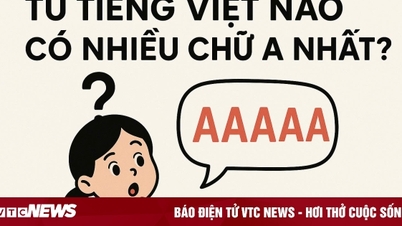



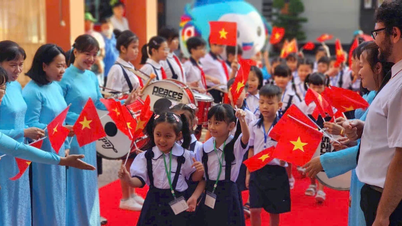













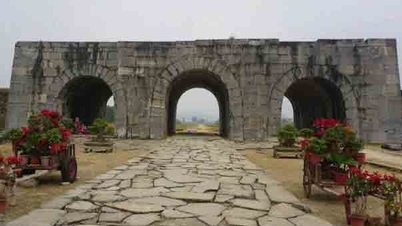







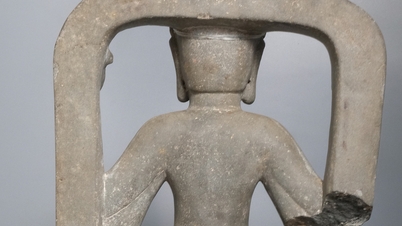


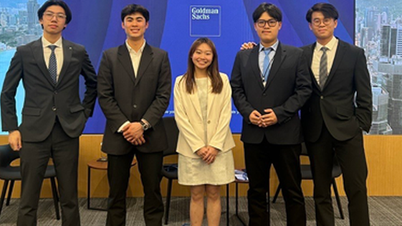














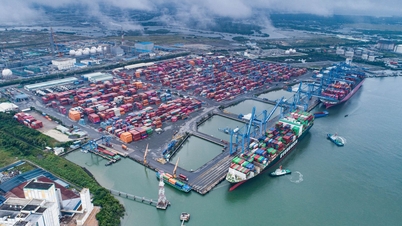













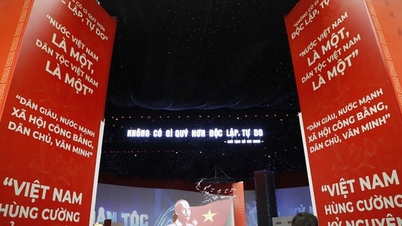









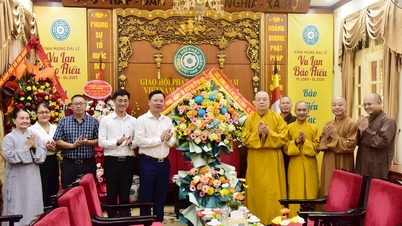













Comment (0)